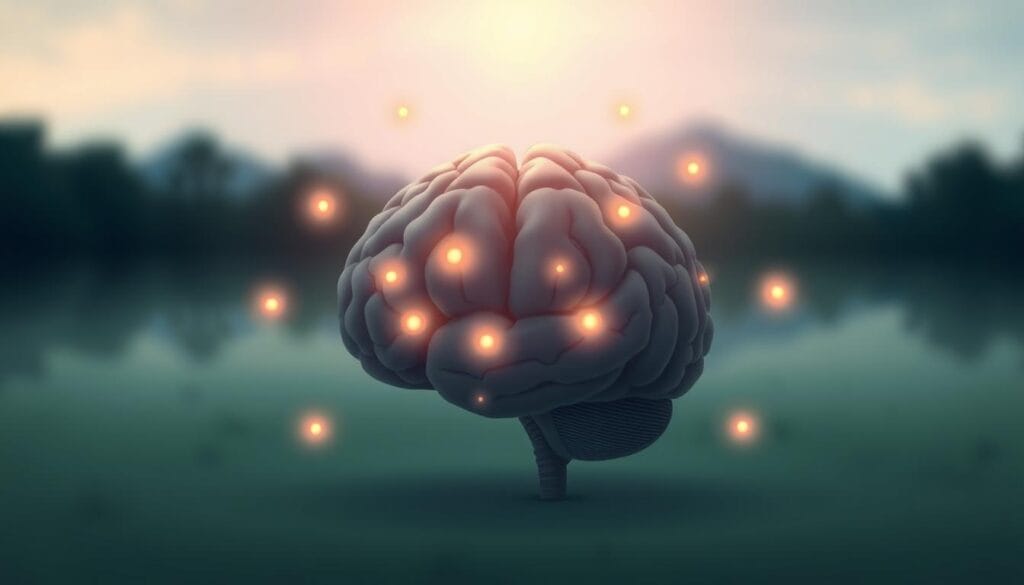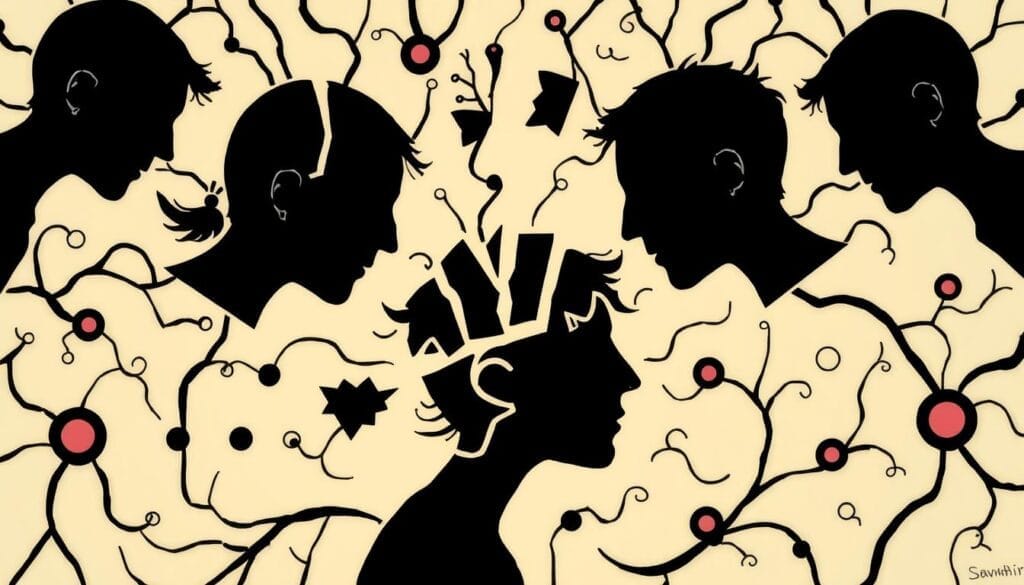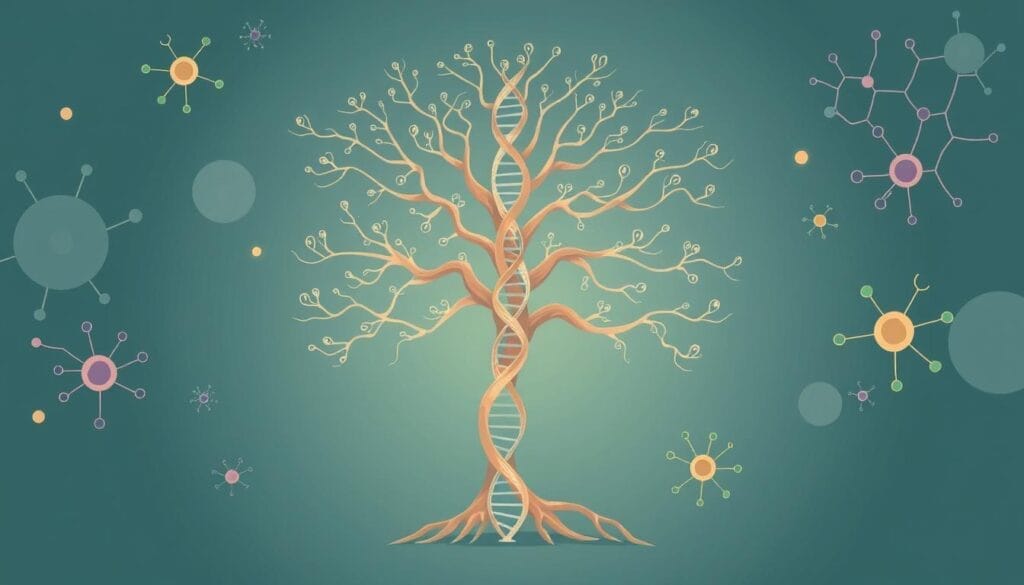Neurological disorders can affect many areas, like thinking and moving. They touch millions of people around the world. Spotting early signs is key to getting help fast and improving treatment.
Conditions like Alzheimer’s, Parkinson’s, and epilepsy show signs early. These signs include problems with thinking and other neurological red flags. Catching them early can lead to better ways to manage these diseases.
Neurological disorders include many conditions that affect the brain, spinal cord, and nerves. They can show up in different ways, like changes in thinking or physical problems. Knowing the early signs helps people get the right medical care. It can also slow down how these conditions get worse.
Table of Contents
ToggleUnderstanding Neurological Disorders
Neurological disorders affect the nervous system’s function. They can come from genetics, infections, injuries, or degeneration. Knowing about these disorders helps in finding the right treatment.
What Are Neurological Disorders?
These disorders mess with the nervous system, which includes the brain and nerves. They can change how we move, feel, speak, think, and even control our body’s basic needs.
Common Types of Neurological Disorders
Some common neurological disorders are:
- Headaches (e.g., migraines, tension-type headaches)
- Seizure disorders (e.g., epilepsy)
- Stroke and other vascular disorders
- Neurodegenerative diseases (e.g., Alzheimer’s disease, Parkinson’s disease)
- Traumatic brain and spinal cord injuries
- Movement disorders (e.g., Huntington’s disease, Parkinson’s disease)
- Sensory disturbances (e.g., neuropathy, vision or hearing impairments)
- Speech and language difficulties (e.g., aphasia, dysarthria)
These conditions can greatly affect a person’s life. Early treatment is key to managing and possibly recovering from them.
The Importance of Early Detection
Early detection of neurological disorders is key for many reasons. [https://drchandrilchugh.com/blog/what-makes-neurology-complex-learn-about-the-medical-world/] It lets us act fast, which can slow down disease growth. It also helps manage symptoms better and improves life quality. Early diagnosis helps plan for future care and choose the best treatments.
It also means patients and families can get support and learn more about their condition sooner. This helps them deal with the condition better.
Why Early Diagnosis Matters
About one in three people worldwide face neurological disorders. Over 600 types of these disorders exist. Catching them early can prevent lasting damage.
Studies show early detection can slow disease growth and lower disability risks.
Potential Benefits of Early Intervention
- Regular health checks and lifestyle changes can save money for those with neurological disorders.
- Quick diagnosis and treatment at a top neurology hospital can greatly improve patient outcomes.
- Early treatment can stop or slow disease growth, like in multiple sclerosis, reducing relapse severity.
- Quick action for strokes can prevent brain damage and boost recovery chances.
- Early detection opens up more treatment options, like medicine, lifestyle changes, and surgery.
- Good treatment from early detection can keep patients functioning well, improving their life quality.
- Early epilepsy management can control seizures, helping patients live more independently.
- Early diagnosis cuts down on long-term care costs.
- Early treatment means less intense care and fewer hospital visits, saving money for patients and families.
In short, catching neurological disorders early is crucial. It ensures timely action, manages symptoms well, and boosts life quality. By tackling these conditions early, people can stay independent and live fulfilling lives.

Key Early Symptoms to Watch For
Early detection of neurological disorders is key. These conditions often start with small, but worrying signs. It’s vital to watch for these signs early, as quick action can greatly help.
Cognitive Changes
Changes in how we think can be an early sign. This might mean trouble remembering things, focusing, or solving problems. People might forget recent events or have trouble making decisions.
These changes can really affect daily life. They can make it hard to do simple tasks or live on your own.
Physical Symptoms
Neurological disorders can also show up physically. You might feel pain, numbness, or tingling. Vision, balance, or coordination issues are also signs.
Severe headaches, seizures, muscle weakness, and trouble with small movements are red flags too. These symptoms can look like other health problems. So, it’s important to see a doctor for a proper check-up.
Spotting these early signs is the first step to getting help. While these symptoms can be scary, seeing a doctor is crucial. They can help figure out what’s wrong and how to manage it.
Behavioral Indicators of Neurological Disorders
It’s important to spot behavioral changes early for neurological disorders. These signs can be mood swings, irritability, or changes in personality. Sleep issues like insomnia or feeling very tired during the day are also warning signs.
Mood Swings and Emotional Changes
Mood disorders like anxiety or depression often come with neurological conditions. People might suddenly feel very angry, sad, or happy. These mood swings can really affect how they live and interact with others.
Changes in Sleep Patterns
Changes in sleep, like not sleeping well or feeling very tired, can signal a neurological issue. You might find it hard to fall asleep, wake up a lot at night, or feel tired during the day. These sleep problems can really hurt your health and happiness.
Spotting these signs helps doctors understand what might be wrong. They can then start helping the patient right away. Catching these problems early is key to managing them and improving life for those affected.

Recognizing Signs in Children
Early detection of pediatric neurological symptoms is key. Children may show signs like delayed developmental milestones or odd behaviors. These could mean a neurological issue. By watching closely, parents and doctors can catch problems early.
Delayed Milestones
Look out for signs like delayed speech, motor skills, or thinking. A child might have trouble with basic actions like sitting or walking. Trouble with words or sentences is another warning sign.
Behavioral Concerns
Behavioral changes can hint at pediatric neurological symptoms. You might see too much activity, trouble focusing, or problems with friends. If a child suddenly loses skills, like speech, it’s time to see a doctor.
Acting fast is very important for kids with developmental delays or neurological issues. Working with doctors helps kids reach their full potential. It ensures they get the right help and care.
Symptoms Affecting Adults
As we get older, we might see signs of neurological disorders. One common sign is memory loss. This could mean you’re at risk for Alzheimer’s or other cognitive decline. You might also struggle with tasks like managing money or following instructions.
Physical symptoms can also show up. These might include tremors, muscle weakness, or trouble with coordination. You might feel numbness, tingling, or have trouble with balance and walking.
Memory Loss
Forgetting things or having trouble remembering recent events is a sign. This adult neurological symptom can get worse. It might make it hard to remember important stuff or do things you’re used to.
Difficulty with Coordination
Neurological problems can also affect how you move. You might have trouble with balance, coordination, or walking. Feeling clumsy or having unexplained falls could be signs of a problem.

If you or someone you know is showing these adult neurological symptoms, get help right away. Catching problems early can really help manage them and keep your life good.
Specific Disorders to Consider
Two important neurological disorders are Alzheimer’s disease and Parkinson’s disease. These neurodegenerative diseases can greatly affect a person’s life. Finding them early is crucial for good care and support.
Alzheimer’s Disease
Alzheimer’s disease causes memory loss and thinking problems. Early signs include trouble remembering things or feeling confused. Mood changes and behavior shifts are also common.
As it gets worse, it can make daily life hard. Spotting Alzheimer’s early is key for the right help.
Parkinson’s Disease
Parkinson’s disease is a movement disorder. It starts with small motor issues like tremors or stiffness. These problems can grow and make daily tasks hard.
Finding Parkinson’s early helps a lot. It makes life better and easier to manage.
Spotting these disorders early is very important. It lets people and doctors act fast. This helps keep health and happiness at their best.
The Role of Family History
Genetic factors are key in many neurological disorders. [https://www.samitivejhospitals.com/article/detail/inherited-neurological-and-nervous-system-disorders] Huntington’s disease is a big example. People have a 50% chance of getting it if a parent has it.
Alzheimer’s and Parkinson’s diseases also have a genetic link. But, they also involve environmental factors.
Knowing your family’s health history is very important. It helps figure out your risk for neurological disorders. It also guides how to prevent them.
Talking to your doctor about your family’s health is key. This helps in early detection and care planning. It also helps manage these conditions better.
Genetic Predispositions
Genetic testing can find out if you’re at risk for certain disorders. For example, certain genes are linked to early Alzheimer’s. The APOE gene is a big risk factor for Alzheimer’s worldwide.
Knowing your genetic risk can help you take care of your health. You can live healthier, get regular check-ups, and join research studies. This helps find better treatments for hereditary disorders.
Discussing Family History with a Doctor
When you talk to your doctor about your family history, be detailed. Include:
- Any neurological disorders or conditions in your family
- The age and severity of these conditions
- Any genetic testing or screening done
- Lifestyle factors or environmental exposures that might have played a role
This info helps your doctor understand your risk. They can then create a plan for you. They might also suggest genetic counseling for more guidance.

When to Seek Professional Help
It’s important to know the early signs of neurological disorders. If you or someone you love has symptoms that won’t go away, see a doctor. They can do a full check-up.
Recognizing Warning Signs
Some signs need quick medical help. These include:
- Sudden, severe headaches
- Unexplained seizures
- Rapid onset of confusion or disorientation
For symptoms that aren’t as bad, see a doctor if you notice:
- Persistent changes in cognitive function, such as memory loss or difficulty concentrating
- Ongoing physical symptoms like numbness, tingling, or coordination issues
- Significant changes in sleep patterns or mood
Preparing for a Doctor’s Appointment
When you set up a neurological evaluation or medical consultation, be ready. Bring all your symptom details. Note how often, how bad, and what makes them better or worse. This helps your doctor find the right treatment.
By spotting early signs and getting help fast, you can get diagnosed sooner. This means you can start treatment sooner too.
Navigating the Diagnostic Process
Diagnosing neurological disorders is a detailed process. It includes many tests and assessments. Doctors use physical exams, neurological checks, and advanced imaging to understand a patient’s condition fully.
Common Tests and Assessments
Neurological testing includes many procedures. These include cognitive tests, reflex checks, and motor and sensory evaluations. MRI and CT scans help see the brain’s structure and find problems.
Blood tests and cerebrospinal fluid analysis also give important information. They help doctors diagnose conditions accurately.
Understanding Diagnostic Results
It’s key to understand test results to make treatment choices. Doctors explain the findings to patients and their caregivers. They address concerns and guide the next steps.
Good communication is vital. It ensures a thorough and personal approach to managing neurological disorders.
FAQ
What are the early symptoms of neurological disorders?
Early signs include memory issues and physical problems like pain or trouble moving. Mood swings and sleep issues are also signs.
Why is early detection of neurological disorders important?
Finding problems early helps treat them faster. This can slow down disease growth and improve life quality. It also helps get support and learn more about the condition sooner.
What are some common types of neurological disorders?
Common ones are Alzheimer’s, multiple sclerosis, epilepsy, Parkinson’s, and stroke. These affect movement, thinking, and feeling.
How can family history affect neurological disorders?
Family history is key for many disorders, as some are genetic. Knowing your family’s health history helps understand risks and prevent problems.
When should someone seek professional help for neurological symptoms?
Get help for sudden severe headaches, seizures, or confusion. For ongoing issues, see a doctor if they get worse or last a long time.
What kind of tests are used to diagnose neurological disorders?
Tests include physical checks, neurological exams, and scans like MRI or CT. Knowing about these tests helps make treatment choices.
About The Author

Medically reviewed by Dr. Chandril Chugh, MD, DM (Neurology)
Board-Certified Neurologist
Dr. Chandril Chugh is a U.S.-trained, board-certified neurologist with expertise in diagnosing and managing neurological disorders, including migraines, epilepsy, Parkinson’s disease, and movement disorders. His clinical focus includes evidence-based neurological care and patient education.
All content is reviewed for medical accuracy and aligned with current neurological guidelines.




